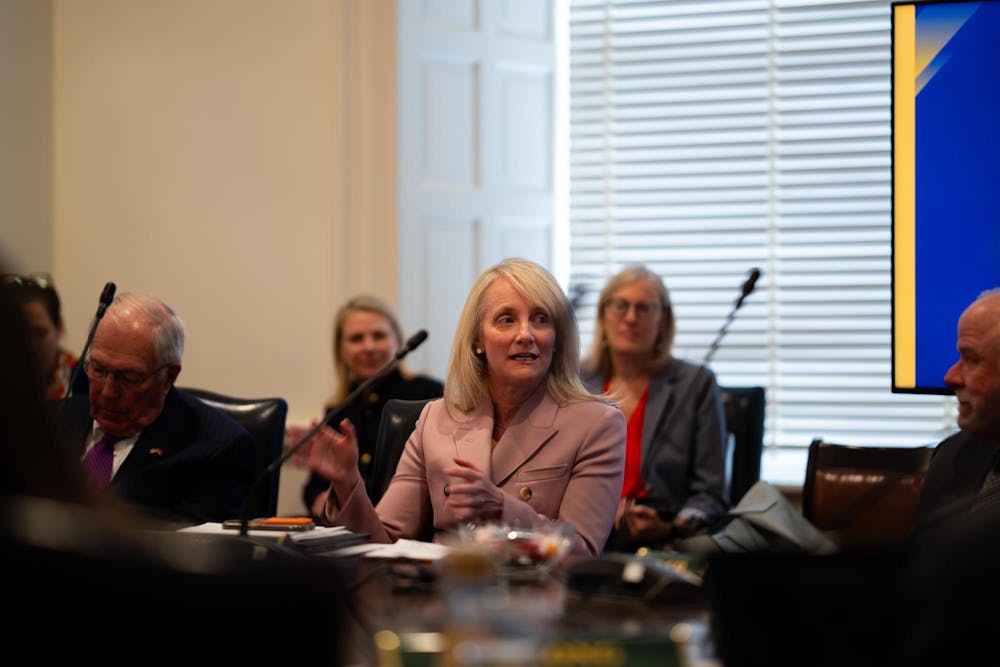Interim University President Paul Mahoney and Board of Visitors Rector Rachel Sheridan defended their deal with the Justice Department in a new letter sent to Charlottesville’s legislators Monday, arguing that it is a better deal than other universities have made and that it does not threaten the University’s autonomy.
Mahoney and Sheridan’s letter responded to a letter sent by Charlottesville Democrats State Sen. Creigh Deeds and Del. Katrina Callsen, in which the pair of legislators criticized the University’s recent agreement with the Justice Department. Both letters were obtained from a source who wished to remain anonymous, and a University spokesperson confirmed their authenticity.
The DOJ agreement suspended the five remaining investigations into the University in exchange for an agreement to follow civil rights laws and provide quarterly reports to the Justice Department on progress toward compliance, which the Justice Department can determine sufficient “in its sole discretion.” It also requires that the University adhere to the Justice Department’s guidance on civil rights law, with the exception that applicable court decisions take precedence over this guidance.
In their letter to the University, Callsen and Deeds said the deal subjects the University to “unprecedented federal control” and called on University leaders to reverse the deal.
“By agreeing to these terms, the University risks betraying the very principles you espouse in your letter: academic freedom, ideological diversity and free expression,” Deeds and Callsen wrote. “For these reasons, we call for immediate action to reverse this surrender of institutional autonomy and reject further federal interference.”
In their response, Sheridan and Mahoney called Deeds and Callsen’s characterization of the deal a “misunderstanding” of the agreement, and provided an explanation of how the deal stacks up against the settlements reached by other universities.
“We respectfully disagree with your assessment of the agreement. As you know, it is the culmination of months of engagement with the Department of Justice (DOJ) and other federal agencies to respond to multiple investigations involving claims that the University violated our nation’s civil rights laws,” Mahoney and Sheridan wrote.
The pair also highlighted that relevant decisions by the Court of Appeals in the Fourth Circuit exempt the University from following Justice Department guidance relating to sexual identity. They emphasized that the courts’ interpretations of civil rights law take precedence over Justice Department guidance, if the two interpretations differ.
The letter also pointed to the fact that the University is not subjected to external monitoring, but rather is responsible for providing its own reports on compliance, an aspect of the agreement which they called “typical in federal relations.”
“This aspect of the agreement differs from the Columbia and Brown agreements,” Mahoney and Sheridan wrote. “Those agreements impose lengthy lists of specific obligations on the universities … Our agreement is different — if the United States believes we are not in compliance, its only remedy is to terminate the agreement.”
Throughout their message, Sheridan and Mahoney emphasized that they worked carefully to vet the terms of the agreement. They noted that, in the event the Justice Department decided the University was not making sufficient progress in efforts to comply with civil rights law, the agreement would be terminated — an event Sheridan and Mahoney argued would put the University in no worse of a position than it was before the deal was signed.
They emphasized that the deal protected the University from millions of dollars in fines, cuts to federal funding and denials of student visas.
“Of the choices we faced, in a situation we certainly did not ask for, it was the best option for advancing the University’s mission in the current environment,” Mahoney and Sheridan wrote.
The latest exchange comes as Deeds has ramped up pressure on the University in recent months. In early October, Deeds told The Cavalier Daily that he hoped to hold hearings in the Senate calling University officials to answer questions about former University President Jim Ryan’s resignation.
The Cavalier Daily confirmed Tuesday that Deeds had asked State Sen. Mamie Locke, chair of the subcommittee on education, to hold hearings the week after Election Day and ask Mahoney and Sheridan to appear.
Deeds also suggested that state funding for the University could be reviewed if the General Assembly was not satisfied with the University’s answers, though he said he did not personally advocate for cutting funding.
A representative from Deeds’ office told The Cavalier Daily Tuesday that he was not sent the response directly, but received it Tuesday through Callsen.
Mahoney and Sheridan concluded their response by maintaining that they believe the deal was the right one, and leaving it open to continued communication with the legislators.
We expect we all would prefer the University not to have faced these investigations. Because that was not our reality, our task has been to work diligently and thoughtfully to protect the University we love,” Mahoney and Sheridan wrote. “We believe we have done that in this case and look forward to continued dialogue with you about how we can continue that work moving forward.”







